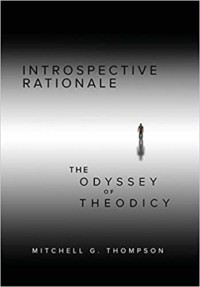Title: Introspective Rationale – The Odyssey of Theodicy
Author: Mitchell G. Thompson
Publisher: Mitchell Thompson
ISBN: 978-1535615341
Pages: 200
Genre: Non- Fiction
Reviewed by: Barbara Bamberger Scott
Pacific Book Review
Examining one of the most puzzling paradoxes in the realm of religion and philosophy, debut writer Mitchell G. Thompson explores ancient history for new to disturb, anyone with a rational mind and a longing for over-arching spiritual answers in his book titled, Introspective Rationale – The Odyssey of Theodicy.
“Theodicy” – the conflict between god(s) (theo) and justice (dicy) – is the encapsulation of a philosophical problem that has long plagued, and will continue absolutes. As author Mitchell puts it, it poses the question, “How could evil exist under the security of God?” If God is omniscient, omnipresent and problem are further questions: how could complex scientific knowledge have arisen in the simple omnibenevolent, why does He allow suffering and sin? Within this Universe originally created by an all-knowing god or gods? And is science morally neutral, beneficial, or dangerous?
To shed light on this multifaceted material, Mitchell devotes much of his treatise to a detailed chronicle of the rise of ancient cultures and world religions including animism, Judaism, Christianity and Islam. He believes that the development of these cultures and beliefs offer us a model of moving from a simplistic, childlike perception of reality to an introspective, inclusive form of consciousness. He uses the analogy of moving from infancy to adulthood. Anyone who has ever looked up into a starry sky may recognize that our “primitive” ancestors were in fact great visionaries who conceived mathematics, astronomy and even religion from such familiar, natural material. Beyond these basic pieces of the puzzle, the author states that there are higher dimensions: introspection leading to the intuitive perception of “emergence phenomenon” – the unseen evidence of essence beyond the physical.
Mitchell is clearly a gifted thinker with ideas well beyond the ordinary realm. By inviting us to study patterns from history, science and religion, he is attempting to lift us out of that realm as well. He often capitalizes the words “our” and “we” as one might capitalize the name of a deity, seemingly to help us accept that we too, are part of the divine scheme. Though there are grammatical flaws in his work, there is also evidence of effort and erudition. At times, too, his narrative is relaxed and humorous, as when he suggests that our lives “could be worse”: we could be trapped in a reality where the only “tweeting” would come from angry birds.
In a response to the paradox of a benevolent God who allows evil to exist, Mitchell advises (with another example of his deft wordplay), “Think of Life as a fair whose fare is unfair.” We can be glad that we are free to choose to be creators, to invent games or simply play them. By this model, the reader may agree that the author of Introspective Rationale is definitely one who has chosen to create.


